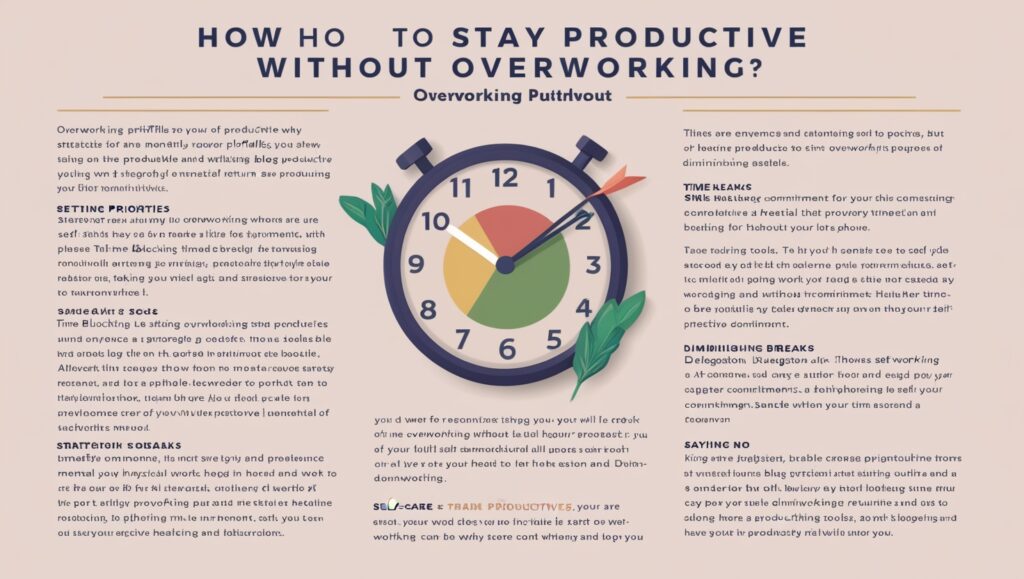How to Stay Productive Without Overworking
In today’s fast-paced world, productivity often feels like a badge of honor. Many of us strive to do more, achieve more, and be more, often at the cost of our well-being. However, productivity doesn’t have to come with exhaustion and burnout. It is possible to stay efficient and achieve your goals while maintaining a healthy work-life balance. Here’s how you can stay productive without overworking.
The Problem with Overworking
Overworking may seem like the path to success, but it often leads to diminishing returns. Common consequences include:
- Burnout: Chronic stress resulting in physical and emotional exhaustion.
- Reduced Efficiency: Fatigue and stress decrease your ability to focus and make sound decisions
- Health Issues: Prolonged overwork can lead to insomnia, weakened immunity, and even cardiovascular problems.
- Strained Relationships: Excessive work can erode personal connections with family and friends.
Recognizing these risks underscores the importance of balancing productivity with self-care.
How to Stay Productive Without Overworking
1. Set Clear Goals and Prioritize
- Define Your Objectives: Understand what truly matters by setting SMART goals (Specific, Measurable, Achievable, Relevant, Time-bound).
- Use the Eisenhower Matrix: Categorize tasks into urgent, important, and non-essential to focus on what needs immediate attention.
2. Plan and Organize Your Day
- Time Blocking: Allocate specific times for tasks, ensuring you dedicate undisturbed focus periods to important work.
- To-Do Lists: Create realistic daily to-do lists and rank tasks by priority. Avoid overloading your schedule.
- Batch Similar Tasks: Group similar tasks, such as responding to emails or making calls, to streamline your workflow.
3. Practice the 80/20 Rule (Pareto Principle)
Focus on the 20% of tasks that deliver 80% of results. Avoid wasting time on low-impact activities, and prioritize what drives the most value.
4. Take Breaks Strategically
- Pomodoro Technique: Work in focused intervals (e.g., 25 minutes), followed by short breaks. This prevents mental fatigue and boosts concentration.
- Active Breaks: Use breaks to stretch, walk, or meditate instead of scrolling on social media. Physical activity can rejuvenate your mind.
5. Learn to Say No
Overcommitment is a fast track to burnout. Politely decline tasks or projects that don’t align with your goals or capacity. Protecting your time is essential for maintaining productivity.
6. Delegate and Collaborate
Recognize tasks that can be handled by others and delegate accordingly. Collaboration not only lightens your workload but also fosters teamwork and efficiency.
7. Limit Distractions
- Create a Dedicated Workspace: Set up a clutter-free, comfortable area for work.
- Digital Detox: Turn off unnecessary notifications, limit social media, and use focus-enhancing tools like website blockers.
- Set Boundaries: Communicate with colleagues and family about your focus times to minimize interruptions.
8. Focus on Health and Well-Being
- Sleep: Prioritize 7-8 hours of quality sleep to recharge your brain and body.
- Nutrition: Fuel your body with balanced meals, avoiding excessive caffeine and sugar.
- Exercise: Regular physical activity improves energy levels and reduces stress.
- Mindfulness: Practices like meditation or journaling can enhance focus and emotional resilience.
9. Leverage Technology Wisely
- Task Management Tools: Use apps like Trello, Asana, or Notion to organize tasks and projects.
- Automation: Automate repetitive tasks like email sorting or social media scheduling to save time.
- Time Tracking: Tools like Toggl or RescueTime help you monitor and optimize how you spend your day.
10. Reflect and Adjust Regularly
- Weekly Reviews: Assess what worked, what didn’t, and adjust your plans accordingly.
- Celebrate Small Wins: Acknowledge your progress, no matter how minor, to stay motivated.
- Adapt to Change: Be flexible and willing to revise your strategies as circumstances evolve.
Signs of Healthy Productivity
- You complete tasks without constant stress.
- You have time for hobbies, family, and relaxation.
- Your work aligns with your goals and values.
- You feel energized, not drained, at the end of the day.
Final Thoughts
Staying productive doesn’t mean working endlessly. It’s about working smarter, not harder. By setting clear goals, planning effectively, prioritizing health, and maintaining a balanced approach, you can achieve more without overworking.
Productivity is a journey, not a race. Focus on sustainable habits that empower you to thrive both personally and professionally. Remember, true success comes from balancing achievement with well-being.
What strategies have helped you stay productive without burning out? Share your tips and experiences in the comments below!

